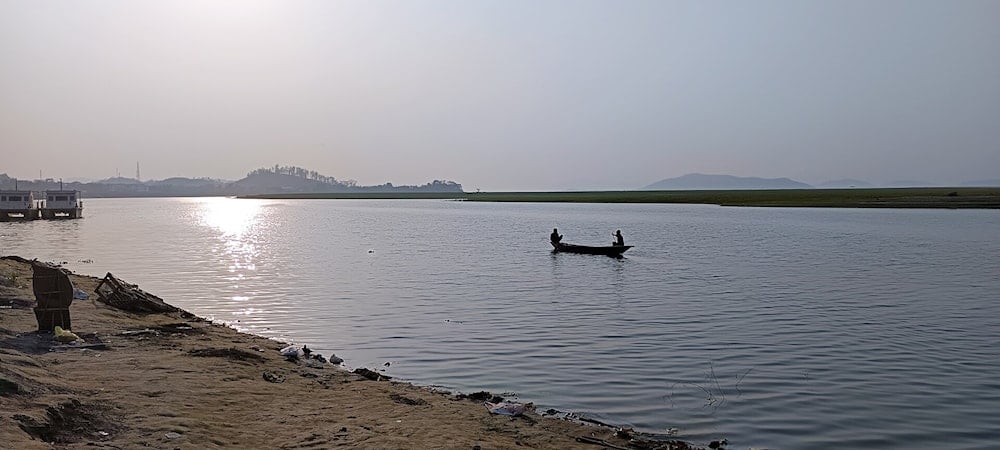India warns Chinese mega-dam could threaten Brahmaputra lifeline
India fears China's $170 billion mega-dam on the Yarlung Zangbo could slash Brahmaputra dry-season flows by up to 85%, prompting Delhi to fast-track its own Upper Siang dam despite local opposition and ecological risks.
-

Brahmaputra from Hatihila Guwahati, 17 March 2024 (Wikicommons)
India is alarmed over China's plan to build the world's largest hydropower dam in Tibet, fearing it could drastically cut water flows into the country and threaten the livelihoods of millions downstream, according to a Monday report by Reuters.
According to four sources familiar with the matter and an internal government assessment reviewed by Reuters, New Delhi estimates that the project could reduce dry-season flows of the Brahmaputra River, known in Tibet as the Yarlung Zangbo, by as much as 85%. The report suggests Beijing's dam, which began construction in July at an estimated cost of nearly $170 billion, could divert up to 40 billion cubic meters of water each year.
Hydrologists, however, note that most of the Brahmaputra's annual discharge originates from rainfall within India and Bhutan during the monsoon season, meaning the river's overall yearly flow is less vulnerable to upstream diversions. The greatest concern lies in the lean months, when Tibetan glacial and snowmelt contributions matter more and water scarcity is acute.
The development has prompted Delhi to accelerate its own massive dam initiative, the Upper Siang Multipurpose Storage Dam in Arunachal Pradesh, which would become the largest such project in India if completed. Government meetings on the project have been held this year, including one convened by Prime Minister Narendra Modi's office in July, sources told Reuters. India's largest hydropower firm has already begun site surveys under armed police protection.
Weaponizing water fears
Analysis by the Indian government warns that cities like Guwahati could face water shortages of 25% without the new project, while the Upper Siang dam's 14 BCM storage capacity could limit that loss to around 11%. The proposed structure is also designed to absorb sudden water surges, with officials considering a plan to keep it 30% empty to counter any sudden releases from Chinese facilities.
Residents of Arunachal Pradesh, however, have long resisted dam-building efforts. Fierce opposition, including violent protests, has stalled previous projects in the region, as locals fear their villages will be submerged and their way of life destroyed. Environmental experts also warn of seismic and ecological risks in the fragile Himalayan belt, raising doubts about the long-term sustainability of such mega-dams.
India's fears stem from the possibility that China could use control of the river as a strategic tool. As one source put it, the dam gives China the means to "weaponize water" at a time when the region is already fraught with territorial disputes. Still, Beijing insists its hydropower projects are run-of-the-river and not intended to reduce flows downstream, a claim that New Delhi views with skepticism given the lack of a binding water-sharing treaty between the two countries.
Read more: China vows rare earth support to India amid warming ties
India's own use of water as leverage
Yet while New Delhi warns of China's ability to "weaponize water," it has itself used similar tactics against Pakistan. The two countries share the Indus River system, regulated by the 1960 Indus Waters Treaty (IWT), which divided the eastern rivers (Ravi, Beas, Sutlej) for India and the western rivers (Indus, Jhelum, Chenab) for Pakistan.
The treaty survived wars and decades of tension, but in April 2025 India suspended the IWT, citing security concerns after the Pahalgam attack. Senior Indian officials, including Foreign Minister S. Jaishankar, have since suggested the suspension is permanent, describing it as a correction of past policy "wrongs."
Even before the suspension, India had repeatedly threatened to restrict Pakistan's water supply, especially after incidents like the 2016 Uri and 2019 Pulwama attacks. By pressing ahead with hydropower and dam projects on the western rivers, New Delhi has drawn consistent objections from Islamabad, which accuses India of violating the treaty's spirit by manipulating flows during critical sowing and harvesting cycles.
With nearly 90% of Pakistan's agriculture dependent on the Indus system, any prolonged upstream diversions or withholding of water could inflict massive damage on Pakistan's economy and food security.
Read more: China pushes Pakistan dam construction after India threatens water cut

 4 Min Read
4 Min Read








